30 Vital Video Marketing Statistics You Need to Know in 2026

Contents
- Top Video Marketing Statistics
- Video Marketing Usage Statistics
- Video Marketing on Social Media Statistics
- Video Marketing on Mobile Statistics
- Video Marketing ROI Statistics
- Video Marketing Costs Statistics
- Video Marketing for Business Statistics
- Take Advantage of These Video Marketing Statistics
- Enjoyed reading these statistics? Find more statistics you need to know in 2026.
By telling a story through video marketing, you have the power to connect with your audience on a much deeper level.
This can ultimately help you generate brand awareness, provide value, and direct more traffic back to your website. And yes, it can even assist you in landing conversions as well.
However, producing video content can be costly when you consider the time, effort, and equipment that’s involved - whether that's working with a video marketing agency or doing it in-house. For that reason, many brands are hesitant to jump on board.
If you’re on the fence about whether or not it’s worth the investment for your brand, this post is for you.
We’ve compiled some video marketing statistics that highlight how effective it’s been for other businesses so you can see how valuable it can be to your online presence.
Stay up to date
Top Video Marketing Statistics
The right time to create video content is now. And no, you don’t have to be a pro with the camera in order to get started. These statistics show just how popular video marketing currently is and that it shows no signs of slowing down any time soon.
There Were An Estimated 3.48 Billion Internet Users Consuming Video Content in 2022
According to data collected by Statista, there were over three billion internet users watching streaming or downloaded video at least once per month in 2023. In the U.S. alone, there were approximately 164.6 million live video viewers in 2024.
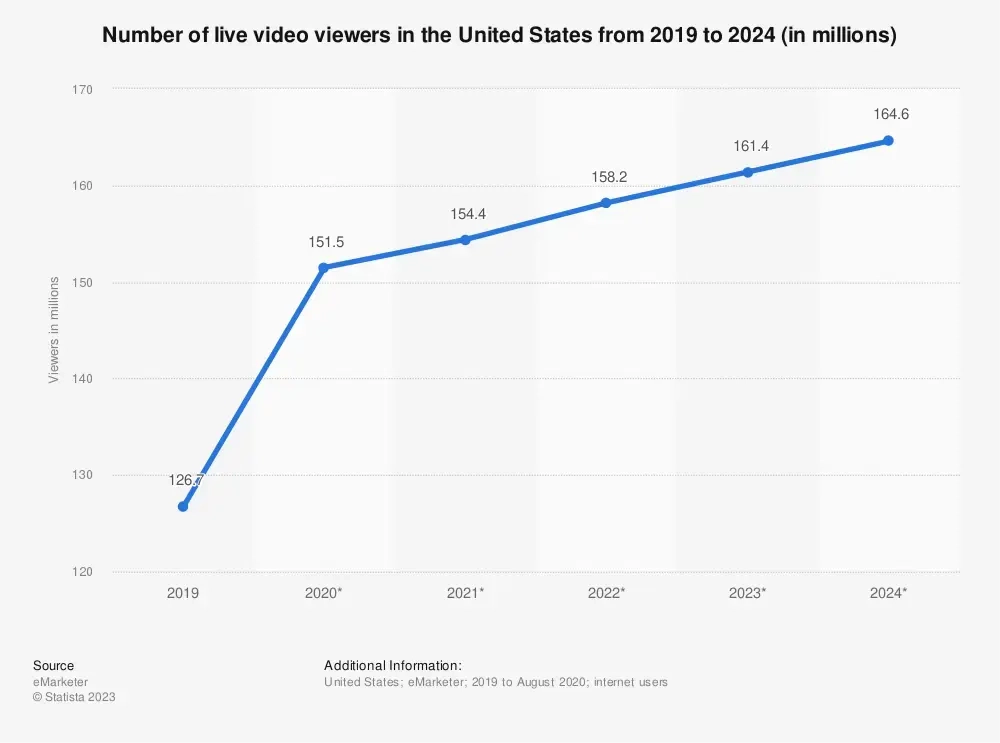
Online Videos Have an Audience Reach of 92% Worldwide
In Q3 2024, it was reported that online videos had an audience reach of 92.3% among internet users worldwide. The most popular types of videos during this timeframe were music videos, comedies, viral videos, and tutorial or how-to videos.
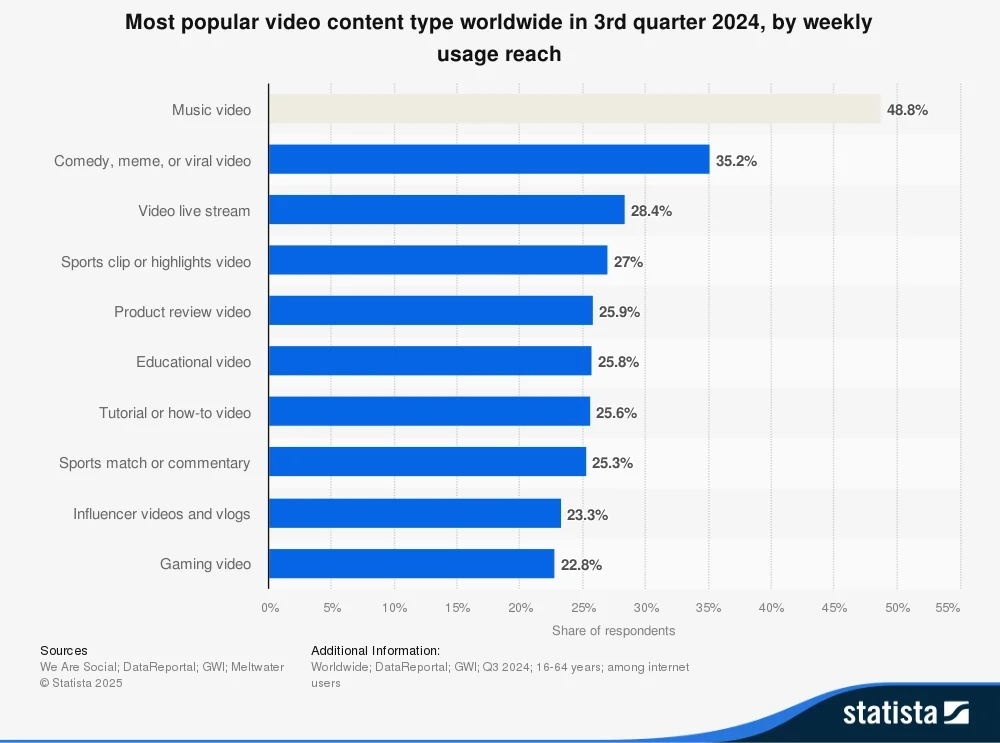
There Has Been a 23% Uptick in Global Internet Traffic Volume
The 2023 Global Internet Phenomena Report by Sandvine, a renowned authority on global application usage and internet traffic trends, reveals a remarkable 23% surge in global internet traffic volume. This boost is attributed significantly to the escalating usage of streaming videos and the ongoing expansion of traffic across various app categories, encompassing gaming, cloud services, VPNs, marketplaces, and conferencing platforms.
Testimonial Videos Have Been a Go-To for B2B Companies
For B2B companies, the most popular type of video content to create was testimonial videos, followed by explainer videos.
Many Content Marketers Feel Their Organization Isn’t Using Video to its Full Potential
Even though the value is made clear by these video marketing statistics, there are still a number of marketers who face challenges when creating this type of content. Statista conducted a survey with a group of content marketers based in the U.S. who are actively creating videos to find out what their biggest video challenges were. Here’s the outcome of that survey:
- 48% said they feel their organization wasn’t using existing video to its full potential.
- 43% said lack of in-house skill (filming, editing, etc.) was another challenge.
- And 40% said their biggest barrier to video marketing was the lack of a budget dedicated to creating videos.
Video Marketing Usage Statistics
Next, let’s dive into some usage-related statistics that show who is consuming video content and how much they’re watching on average. This data reaffirms that many people are enjoying online videos, giving marketers even more reason to make video creation part of their content strategy.
The Global Average for Video Consumption is 17 Hours Per Week
In 2023, individuals are dedicating an average of 17 hours per week to online video consumption, marking a slight decline from the preceding year's average of 19 hours.
14.9% of Millennials Watch 10-20 Hours of Online Video Per Week
It’s no secret that the Millennial generation (those born between 1981-1996) spends quite a bit of time online. And it appears that a good chunk of that time is spent watching videos. According to research from Statista, 14.9% of Millennials watched 10-20 hours of videos per week. These are important video marketing statistics to be aware of because it’s a good sign that you can reach a Millennial audience through video content.
In the U.S., 253 Million YouTube Users Engage With Video Content
As of February 2025, India dominated the global YouTube landscape, boasting a substantial audience of about 491 million users on the popular social video platform. The United States secured the second position with around 253 million YouTube viewers, while Brazil claimed the third spot, drawing in 144 million users to engage with content on YouTube. Meanwhile, the United Kingdom witnessed approximately 54.8 million internet users actively participating on the platform during the assessed period.
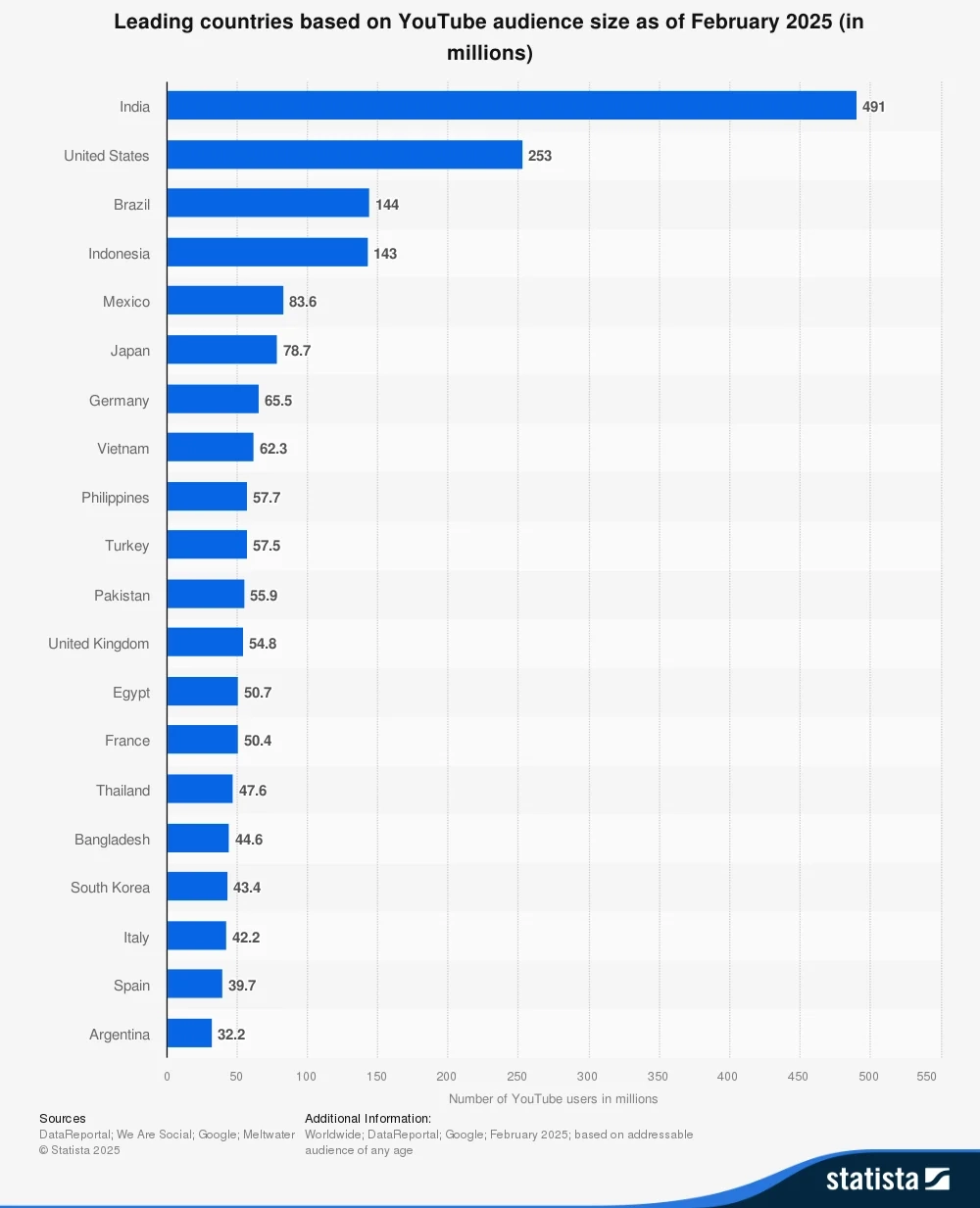
Video Marketing on Social Media Statistics
Social media is clearly one of the hottest ways to share video content online. Whether you’re using Facebook, Instagram, or any other platform, it’s an effective way to reach your audience and establish a connection. The key to making video work for you is being where your audience is. These video marketing statistics show which platforms to consider in the year ahead.
There’s a Disconnect in Where Consumers Engage with Video and Where Marketers are Spending Their Budges
The recent findings from The Sprout Social Index™ 2022 reveal an interesting dynamic in consumer and marketer perspectives on YouTube. A significant 51% of consumers intend to invest more time on YouTube in the coming year, positioning it as the second most popular platform after Facebook.
In contrast, a mere 35% of marketers anticipate utilizing the platform in the next 12 months. This noticeable disparity unveils an evident opportunity for astute brands aiming to seize a competitive edge. Recognizing the consumer inclination towards YouTube while marketers are less inclined presents an open arena for brands to strategically tap into the platform, potentially reaching a receptive audience and gaining a distinct advantage in the evolving digital landscape.
Video Marketing on Mobile Statistics
These days, there are a few ways we can consume video content. We watch videos on our desktop computers, our smartphones, tablets, and even our televisions. Which one we choose typically depends on personal preference and where we happen to be when we stumble upon a captivating video.
With so many options, marketers need to remember to create video that accommodates each device. However, it’s clear that mobile is a popular choice since our smartphones tend to be with us everywhere we go. Here are some mobile-specific video marketing statistics you should know:
90% of Consumers Watch Videos on Their Mobile Devices
In March 2023, nearly 70% of the digital video audience in the United States preferred watching videos on their smartphones, surpassing the 59% who opted for smart TVs—a more traditional device for online video consumption. On average, approximately 16% of the total streaming time in North America was dedicated to engaging with video content through smartphones and mobile devices.
Video Marketing ROI Statistics
Of course, the ultimate test in determining whether or not video marketing is a worthwhile investment is the ROI (return on investment).
As with anything in business, you want to ensure you’re generating results (traffic, engagement, conversions) from the content you’re putting out into the world.
Here are some video marketing ROI statistics that show the results others have received:
92% of Video Marketers Are Satisfied With the ROI on Their Video Marketing
According to Animoto, 92% of businesses are satisfied with the ROI of their video marketing on social media. Further, 91% of businesses now leverage video as a key marketing tool—an unprecedented peak since we began monitoring this data. Furthermore, 96% of marketers, the highest proportion in the past nine years, recognize video as a crucial component of their marketing strategy.
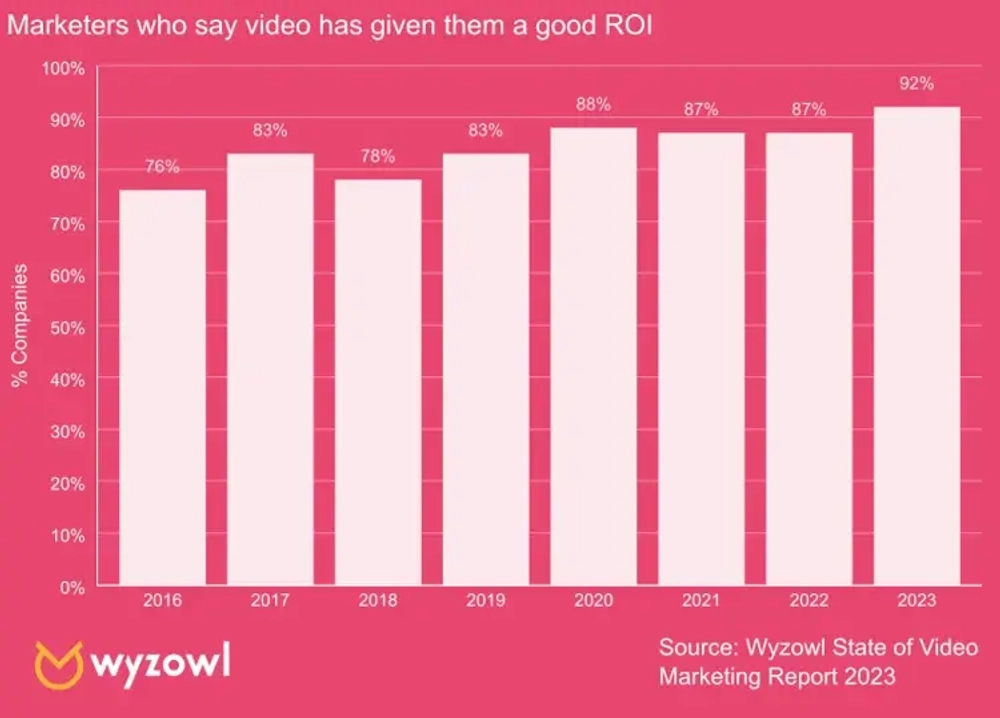
78% of Marketing Professionals Say Videos Helped Increase Sales
Impressively, 87% of marketers acknowledge that video yields a direct, positive impact on sales—an all-time high in reported sentiments.
An overwhelming 96% of marketers concur that videos play a pivotal role in enhancing user comprehension of their product or service.
Remarkably, this percentage has consistently remained above 93% since 2015, with the current data reaching the highest point in the last five years. That’s always a win!
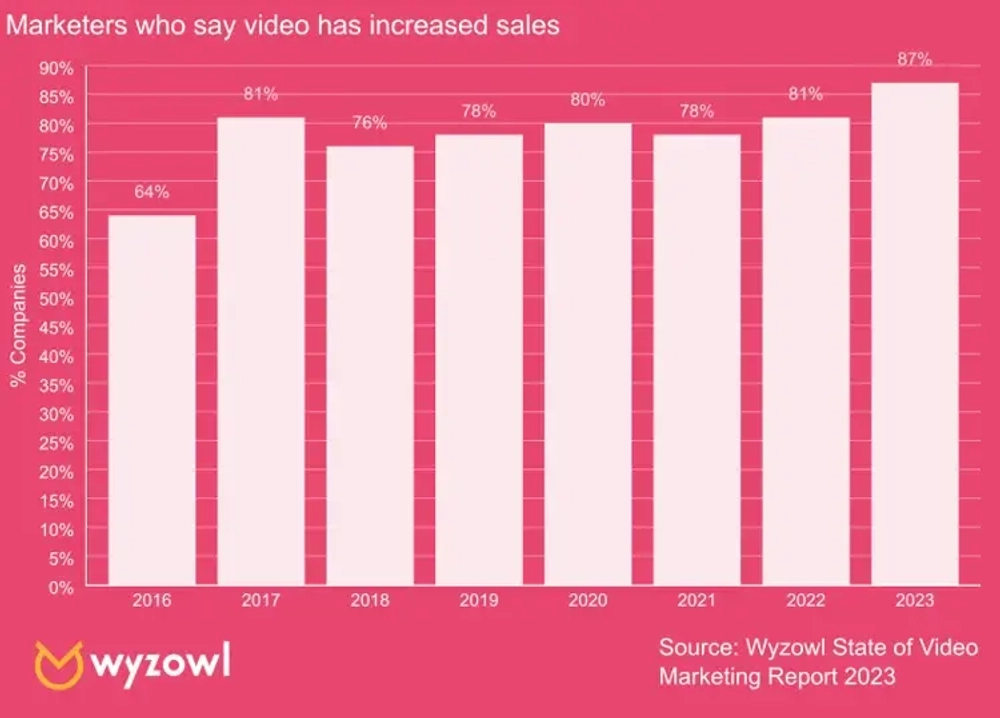
Video Marketing Costs Statistics
There’s no denying that you’ll likely have to put in some money upfront in order to get started with video marketing.
You may want to invest in equipment, such as a camera and microphone if you aren’t going to be recording with your smartphone. Then, there’s the cost of editing software or hiring an editor. These types of expenses will vary depending on what you choose to spend.
However, if you’re planning to run video ads, you may be curious what it’ll cost you to get an ad up and running.
While this will vary depending on the type of ad and your industry, these video marketing statistics will give you an idea of what to expect:
60% of Content Marketers Plan to Increase Their Video Budget for 2022
Clearly, there are some content marketers who recognise the power of video marketing! In September 2021, Statista conducted a survey featuring a group of content marketers in the U.S. who are already making videos. 60% of them said they planned to increase their video budget for 2022, allowing them to take their video marketing to the next level. 24% of those marketers said they intended to increase their budget by 9%.
Video Advertising Spending in the U.S. Doubled From 2020 to 2023
In the year 2021, the estimated expenditure on digital video advertising in the United States reached 23.5 billion U.S. dollars. Projections for 2023 suggest a significant surge, with spending reaching 52.1 billion, effectively more than doubling the figure recorded in 2020.
YouTube Ads Have an Average Cost-Per-View of $.010-$.030
YouTube is one of the biggest platforms for video ads, as marketers are able to target the 2.70 billion people worldwide (in 2022, the viewership on YouTube reached a substantial 210 million in the United States alone) who use YouTube at least once per month. Running an ad on the platform is estimated to have an average cost-per-view of $.010-$.030. To reach 100,000 viewers, you’re looking at spending around $2,000.
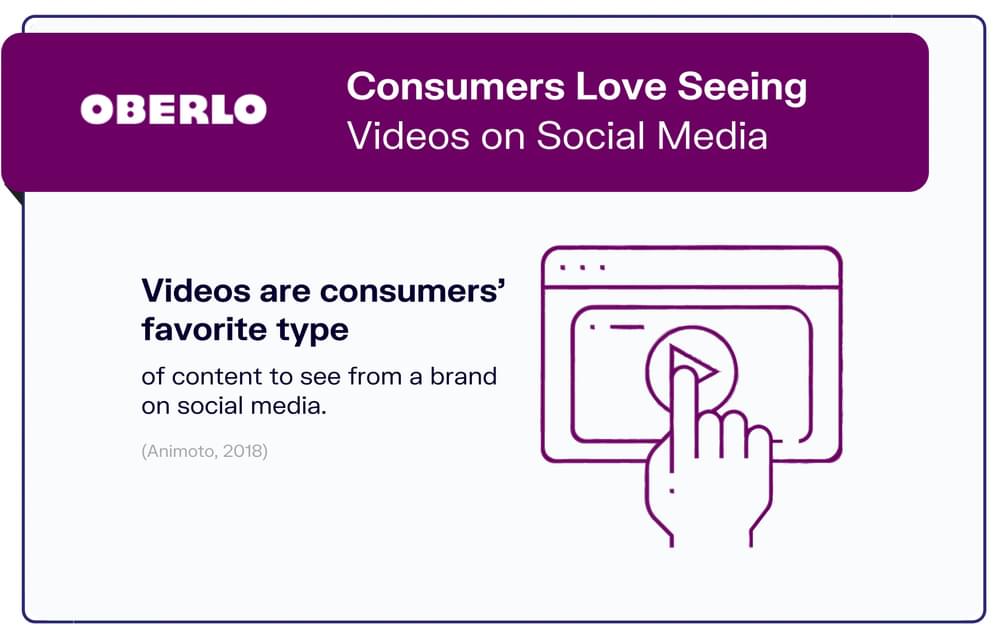
Video Marketing for Business Statistics
Finally, let’s dive into a few video marketing statistics for businesses that show why video is a great move for any business. Although video requires time and financial commitment from businesses that choose to invest in it, the return will likely provide tremendous benefits.
Videos Are a Favourite Among Consumers
To make it quite simple, consumers love video content. According to Animoto, 73% of consumers have been influenced by a brand’s social media presence when making purchasing decisions. So if a consumer loves your content, they’ll be more inclined to buy. All the more reason to create great videos!

71% of B2B Marketers Use Video Marketing, While 66% of B2C Do
Video marketing is popular with both B2B and B2C companies, as it’s a beneficial way to reach audiences of all demographics. According to data gathered by Content Marketing Institute in 2020, 71% of B2B marketers are using video marketing. 66% of B2C marketers are creating videos.
96% of People Turn to Videos to Learn More About a Product or Service
It turns out, a lot of people rely on videos to learn more about various products and services. 96% of people, in fact! That’s a good reason for brands to get on board with video marketing so they can have content ready and waiting should potential customers search for what they’re offering.
Take Advantage of These Video Marketing Statistics
There’s no time like the present to get started with video marketing!
Use these statistics to shape your video strategy and the content you produce. Done right, a great video can help you develop a strong connection with potential customers that can lead to more website traffic, increased engagement, and conversions. And who wouldn’t want that?
If you're looking for a video marketing partner, then check out some of the work we've done for our clients at The Social Shepherd.
Enjoyed reading these statistics? Find more statistics you need to know in 2026.

You might also like
Don’t be sheepish
let’s talk








